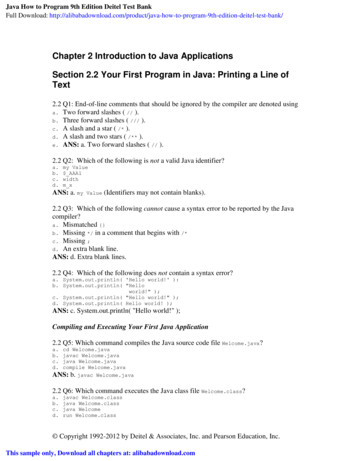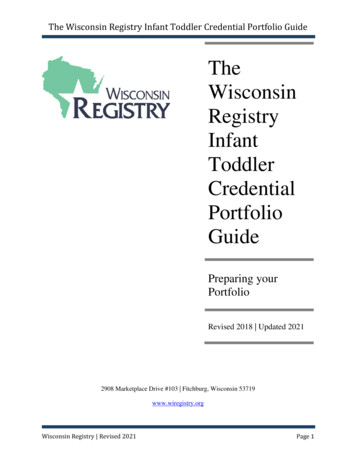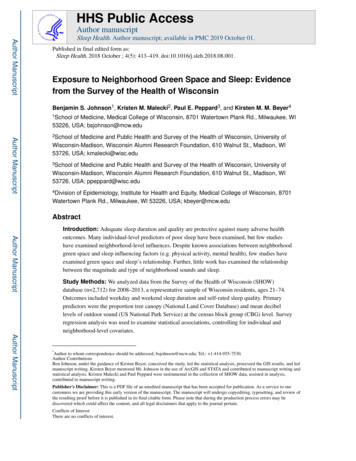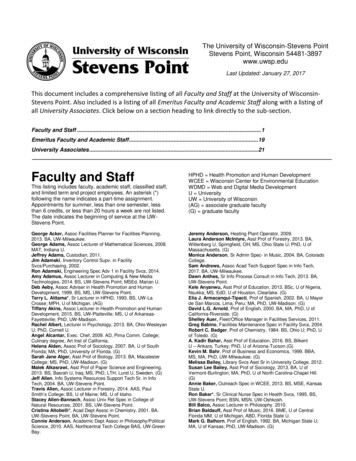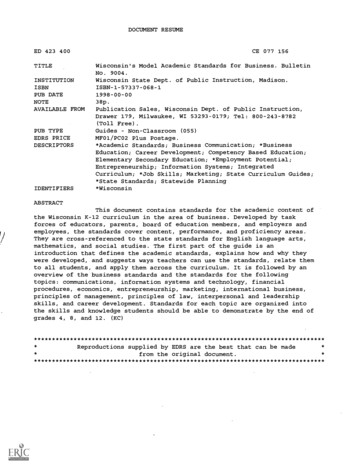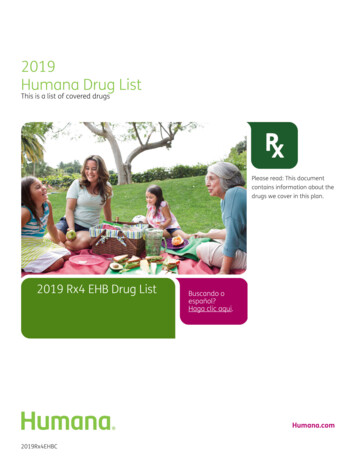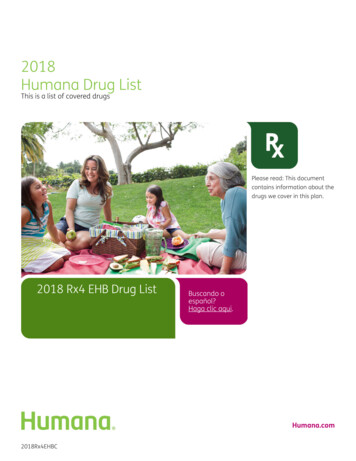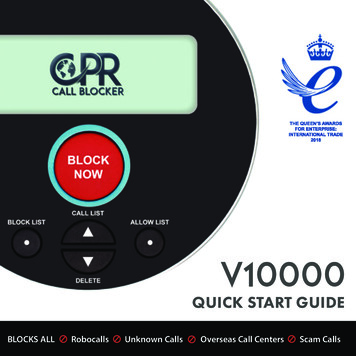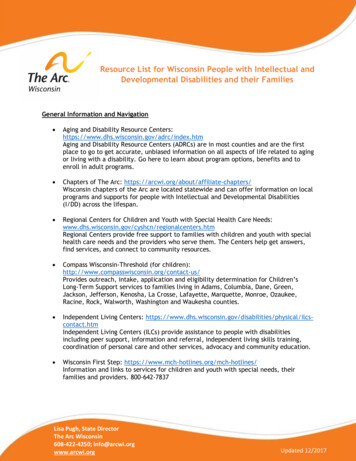
Transcription
Resource List for Wisconsin People with Intellectual andDevelopmental Disabilities and their FamiliesGeneral Information and Navigation Aging and Disability Resource tmAging and Disability Resource Centers (ADRCs) are in most counties and are the firstplace to go to get accurate, unbiased information on all aspects of life related to agingor living with a disability. Go here to learn about program options, benefits and toenroll in adult programs. Chapters of The Arc: in chapters of the Arc are located statewide and can offer information on localprograms and supports for people with Intellectual and Developmental Disabilities(I/DD) across the lifespan. Regional Centers for Children and Youth with Special Health Care .htmRegional Centers provide free support to families with children and youth with specialhealth care needs and the providers who serve them. The Centers help get answers,find services, and connect to community resources. Compass Wisconsin-Threshold (for us/Provides outreach, intake, application and eligibility determination for Children’sLong-Term Support services to families living in Adams, Columbia, Dane, Green,Jackson, Jefferson, Kenosha, La Crosse, Lafayette, Marquette, Monroe, Ozaukee,Racine, Rock, Walworth, Washington and Waukesha counties. Independent Living Centers: l/ilcscontact.htmIndependent Living Centers (ILCs) provide assistance to people with disabilitiesincluding peer support, information and referral, independent living skills training,coordination of personal care and other services, advocacy and community education. Wisconsin First Step: ion and links to services for children and youth with special needs, theirfamilies and providers. 800-642-7837Lisa Pugh, State DirectorArcWisconsinTHE ATheRC WISCONSINRESOURCE LIST608-422-4250; info@arcwi.orgwww.arcwi.org1Updated 12/2017
Wisconsin Board for Persons with Developmental Disabilities: http://wi-bpdd.org/Advocates for the independence and inclusion of people with developmentaldisabilities through a series of projects, trainings, public policy work and fundingopportunities available to the public. The Waisman Center: https://www.waisman.wisc.edu/The Waisman Center University Center for Excellence in Developmental Disabilitiessupports the full inclusion and self-determination of people with developmentaldisabilities and their families through a variety of programs including personneldevelopment, direct services and clinics, technical assistance and informationdissemination. 1-800-532-3321Assistive Technology Wisconsin's Assistive Technology Program es/wistech/index.htmLoan program: es information on selecting, funding, installing and using assistive technology.608-266-3118 IndependenceFirst: ve-technologyHelps identify useful adaptive equipment, vendor resources, and funding resources.414-226-8385 Communication Aids & Systems Clinic (CASC): https://www.waisman.wisc.edu/clinicsaugcomm.htmThe Waisman Center Communication Aids & Systems Clinic (CASC) provides highlyspecialized, cutting-edge augmentative and alternative communication (AAC) solutionsfor children and adults experiencing significant communication difficulties. 608-2633301 Wisconsin Independent Living /physical/ilcs-contact.htmWisconsin’s eight ILCs are Device Loan and Device Demonstration Centers as part ofthe WisTech Assistive Technology Program.Benefits Benefit specialists: counties.htmBenefit specialists provide help to older adults and people with disabilities withquestions and problems related to benefits such as Medicare, Medicaid, SocialSecurity, FoodShare, and health insurance. Contact your local ADRC to find a benefitspecialist in your area. Supplemental Security Income (SSI): https://www.ssa.gov/disabilityssi/Social Security pays benefits to people who can’t work because they have a medicalcondition or disability. Federal law requires a very strict definition of disability. Applyfor Supplemental Security Income at the nearest federal Social Security office. Call 1800-772-1213THE ARC WISCONSIN RESOURCE LIST2
Applying for Social Security Disability Factsheet-AD.pdf (In Spanish:https://www.ssa.gov/disability/SP dib starter kits adult.htm?) Instructions to Apply on-line for SSI: ult-child.pdf FoodShare lth/imagency/index.htmHelps low-income families and individuals buy nutritious food. You must apply to findout if you are eligible for FoodShare benefits. Apply on-line or ask at the ADRC.Caregiver Supports & Respite Respite Care Association of Wisconsin: https://respitecarewi.org/live/A resource and referral agency that assists in locating a respite service and otherresources in your area. 608-222-2033 Caregiver Support Programs: http://wisconsincaregiver.org/Provides information and assistance to help people better care for their loved ones –and themselves. Can arrange for services and help families understand their optionsfor care, Caregiver support programs are available in every community. Contact yourlocal ADRC at https://www.dhs.wisconsin.gov/adrc/index.htm; Or contact a caregiverresource specialist: (866) 843-9810 Dementia Care Specialists: ecialist-program.htmProvide information and assistance about Alzheimer's disease and other dementias.Children-Specific Programs Wisconsin Department of Health Services (DHS) Programs for Children with n/index.htmWisconsin has multiple programs available for children with delays or disabilities. Finda comprehensive listing here. Wisconsin’s Birth to 3 Program: e Wisconsin Birth to 3 Program serves children under the age of 3 withdevelopmental delays and disabilities and their families. Katie Beckett Medicaid: https://www.dhs.wisconsin.gov/kbp/index.htmThe Katie Beckett Program is a special eligibility process that allows certain childrenwith long-term disabilities, mental illness, or complex medical needs, living at homewith their families, to access Medicaid-funded healthcare.THE ARC WISCONSIN RESOURCE LIST3
Children’s Long-Term Supports tmThe Children's Long-Term Support (CLTS) Waiver Program provides Medicaid fundingfor children who have substantial limitations in their daily activities and need supportto remain in their home or community. Eligible children include those withdevelopmental disabilities, severe emotional disturbances, and physical disabilities.Funding can be used to support a range of different services. Children’s Community Options Program tmCCOP may be able to provide funding and service coordination for your family if youneed help caring for your child with long-term support needs. CCOP funding can beused for a range of supports and services. Autism Supports: pply.htmFamilies with children with autism may qualify for two different types of treatment:comprehensive and focused. Children’s Mental Health: https://www.dhs.wisconsin.gov/mh/children.htmThe Wisconsin Department of Health Services supports programs that offer services toyoung children, youth, and young adults with mental health challenges.Decision-Making Supports and Guardianship Statewide Resources on Supported Decisionmaking: http://wibpdd.org/SupportedDecision-Making/ Supported Decisionmaking for Transition Age ised-May-2016.pdf The Wisconsin Guardianship Support Center: pport-center.htmlProvides information and assistance on issues related to guardianship, protectiveplacement, advance directives, and more. 855-409-9410 Client Rights-Guardianship:Takes calls about client rights if someone is receiving services for mental illness, adevelopmental disability, or substance abuse in Wisconsin and has a guardian. 608266-9369 Helpful Video from The Arc of the United States:o Decision-Making Options: https://youtu.be/rBNL R4sJPoTHE ARC WISCONSIN RESOURCE LIST4
Education Department of Public Instruction - Special nformation on rights and other resources available to eligible children with disabilitiesin Wisconsin public schools. Wisconsin FACETS www.wifacets.orgConnects families to community resources. Educates parents on their rights and how touse those rights to become involved in their child’s education. 877-374-0511 Wisconsin Statewide Parent-Educator Initiative (WSPEI): http://wspei.org/contact/WSPEI assists families and educators to find resources, build relationships leading topositive outcomes for children’s learning. Parent educators provide free support. Transition Improvement Grant www.witig.org/Provides professional development to Wisconsin youth, parents, educators and allstakeholders in postsecondary transition for students with disabilities. TIGCoordinators are located throughout Wisconsin. Search for transition and othersupports by county: yment Wisconsin Division for Vocational ral request.htmDVR services are available to people with disabilities who have difficulty finding orkeeping a job. After application DVR can take 60 days to determine eligibility. Applyonline. Employment Resources, Inc: https://www.eri-wi.org/Supports people with disabilities in achieving employment goals, receiving benefitscounseling, accessing healthcare, and connecting to financial information andresources. 1-855-401-8549 Medical Assistance Purchase Plan ications/p-10071.htmOffers people with disabilities who are working or interested in working theopportunity to buy health care coverage through the Wisconsin Medicaid Program. Wisconsin Employment First: http://www.wiemploymentfirst.com/Resources and connections to seek Competitive Integrated Employment Contact theWisconsin Board for Persons with Developmental Disabilities: 608-267-9897 Employment Success Stories for people with blog/stories/THE ARC WISCONSIN RESOURCE LIST5
Work Incentives Benefits Counseling: http://www.eri-wi.org/programs/WIPA/People who receive disability benefits can still work but may need to use workincentives tools and access the guidance of a work incentives benefits counselor. Askyour DVR Counselor or contact the Work Incentives Planning and Assistance (WIPA)program.Family Supports Family Voices of Wisconsin: http://www.familyvoicesofwisconsin.com/Helps families who have children and youth with disabilities and/or special health careneeds navigate health care and community supports. 608-828-9959 Wisconsin Family Ties: http://www.wifamilyties.org/Information, resources and support for families with children who have emotional,mental health or behavioral disorders. 1-800-422-7145 WisconSibs: http://wisconsibs.org/Serving Wisconsin brothers and sisters with siblings with disabilities. Offers Sibshops and camps for boys and girls, future-planning training and social events for adults andfamilies. 920-968-1742 Parent 2 Parent of Wisconsin: http://www.p2pwi.org/aboutus.htmlProvides support to parents of children with special needs through a one-to-oneconnection with another parent who has similar experience. 888-266-0028 Alianza Latina Aplicando Soluciones: www.alianzalatinawi.orgHelps to promote the independence of persons with disabilities by providinginformation and support to them, their families, and their service providers in theareas related to but not limited to education and health. 414-643-0022 Parent University: parentuniversity41@gmail.comConnects African American families in Milwaukee to resources and information;provides supports so they can become leaders. 414-208-9410 Family Friendly Guide for Families in Milwaukee /uploads/2017/10/DRWEASSYBooklet.pdfFinancial and Legal Planning Resources Special Needs Alliance: ey/wisconsin/A national organization comprised of attorneys who can help answer questionsabout public benefits, special needs trusts, guardianships/conservatorships, planningfor disabilities and special education issues.THE ARC WISCONSIN RESOURCE LIST6
Wispact: https://www.wispact.org/about-wispact/A private nonprofit organization that administers pooled and community Special NeedsTrusts for people with disabilities. 800-943-7386 press 9, press1, enter Ext. 53975 Opening an ABLE Account in Wisconsin: nts.aspxWisconsin residents may establish an ABLE account in another state as Wisconsin doesnot have its own ABLE program. Wisconsin residents may compare other state ABLEprograms through the ABLE National Resource Center www.ablenrc.org What is a Special Needs Trust?: eds-trust-13601 The Life Navigators Trust Program: m/Pooled trust and other trust resources and information. 414-774-6255Future Planning The Arc Center for Future Planning: futureplanning.thearc.org/Tools and information to help families with a person with I/DD plan for the future. Online planning available. A Journey Forward: d-futureplanning/Training specifically designed for adult siblings of persons with I/DD to plan for thefuture of their family. Helpful Videos from The Arc of the United States:o Why Future Planning is Important: https://youtu.be/1Z0m2MJsStwo Your Next Home: https://youtu.be/iqdd Mby4RYo What to Know about Public Benefits: https://youtu.be/2SY1pGXnMKco What to Know about Trusts & ABLE Accounts: https://youtu.be/Zkiydp7VCXko Building a Career: https://youtu.be/a5xVSBjgYOQo Decision-Making Options: https://youtu.be/rBNL R4sJPoo Growing Your Social Network: https://youtu.be/sNJ58kRWx74o Building Good Relationships: https://youtu.be/HKCtotp9JcEo Dealing with Changes, Grief, and Loss: https://youtu.be/0GrFMkLrDv8 Person-Centered Planning Resources:o Planning Alternative Futures with Hope (PATH) .php/en/map-andpath/patho “It’s My hoice/Its My Choice.pdfTHE ARC WISCONSIN RESOURCE LIST7
Healthcare Wisconsin Medicaid Programs: sconsin's ForwardHealth Medicaid is public health insurance for the elderly, blind ordisabled who meet eligibility requirements. You can apply for Medicaid online, byphone, by mail, or in person with your local agency. https://access.wisconsin.gov/ ABC for Health, Inc. http://www.safetyweb.org/index.htmlProvides health care consumers with the information, advocacy tools, legal services,and expert support they need to navigate the health care financing system. Healthbenefits counselors are available to answer questions. 800-585-4222 Provider Search Tool: h.htmA fast method for consumers to find a health care facility or care provider as well ascompliance history for Wisconsin providers regulated by the Wisconsin Department ofHealth Services (DHS). Self-Directed HealthCare Kit: hcare-kit-available/A tool to help people with disabilities set up and prepare for healthcare appointmentsby gathering needed information ahead of time. Medical Assistance Purchase Plan ications/p-10071.htmOffers people with disabilities who are working or interested in working theopportunity to buy health care coverage through the Wisconsin Medicaid Program.Housing Movin’ Out Inc. http://www.movin-out.org/about.htmlProvides information and resources covering a wide range of housing options toWisconsin households that include a family member with a permanent disability.Contact: info@movin-out.org or 877-861-6746 x7 Community Supported Living: rint.pdfCommunity Supported Living is a flexible partnership that enables a person needingsupport to live in their own home with support from an entity that providesindividualized assistance. (Contact your Family Care or IRIS agency to ask aboutoptions for Community Supported Living and providers in your area.) Housing – Where Do We Start? ilities.pdf Housing Discrimination Resources:https://www.hud.gov/topics/housing discrimination Housing and Urban Development (HUD) FAQ: https://www.hud.gov/faqsFind out about public housing, Section 8, rental assistance, home buying options andmore.THE ARC WISCONSIN RESOURCE LIST8
Wisconsin Home Energy Assistance Program (WHEAP):http://www.homeenergyplus.wi.gov/Provides assistance for heating costs, electric costs, and energy crisis situations foreligible low-income individuals.Long-Term Services and Supports Comparison chart of Wisconsin Long-Term Care programs for p0/p00570.pdf Covered Services in Wisconsin Long-Term Care s/p0/p00088oa.pdf Family Care: Family Care is a managed care long-term care program that helps frail elders andadults with disabilities get the services they need to remain in their homes. Peoplewho are eligible for long-term care have the choice of IRIS or managed care. Must firstundergo a functional screen process to determine eligibility. Contact your Local ADRCto find Family Care organizations serving your region. IRIS: https://www.dhs.wisconsin.gov/iris/index.htmIRIS is a self-directed long-term care option. The participant manages an IndividualServices and Supports Plan within an individual budget and the guidelines of allowablesupports and services to meet his or her long-term care needs. The participant has theflexibility to design a cost-effective and personal plan. People who are eligible forlong-term care have the choice of IRIS or managed care. Must first undergo afunctional screen process to determine eligibility. Call the IRIS Service Center 1-888515-IRIS (4747). Family Care and IRIS Ombudsman /fcopSupports people experiencing problems with the Family Care, Partnership, or IRISprograms through independent ombudsman resources. 800-928-8778 Save IRIS: http://www.saveiris.org/home-1.htmlSave IRIS, Wisconsin's Self-Direction Advocates” is a non-partisan grassroots movementdedicated to preserving and promoting self-direction in Wisconsin.Mental Health Supports Mental Health - Partner/Provider tm NAMI Wisconsin: omotes public education and understanding of mental illnesses. Provides follow-upadvice and counsel; educational and training programs and materials; access tofinancial resources as appropriate; and offers conferences, seminars, andpresentations. 800-236-2988THE ARC WISCONSIN RESOURCE LIST9
Mental Health America of Wisconsin: http://www.mhawisconsin.org/aboutProvides information about mental health and mental illness to individuals,professional organizations and the community. 866-948-6483 Wisconsin Family Ties: http://www.wifamilyties.org/Information, resources and support for families with children who have emotional,mental health or behavioral disorders. 1-800-422-7145 Grassroots Empowerment Project (GEP): http://grassrootspower.org/A statewide organization controlled and directed by mental healthconsumers/survivors helps people seeking mental health, recovery and wellness. (715)310-2280Recreation & Social Local Chapters of The Arc: in chapters of the Arc offer a variety of recreational and social opportunitiesfor people with disabilities. Special Olympics Wisconsin: regions/Provides year-round sports training and competition in a variety of Olympic-type sportsfor children and adults with intellectual disabilities. Regional groups. 608-222-1324 Best Buddies Wisconsin: https://www.bestbuddies.org/wisconsin/Offers One-to-One Friendship and Leadership Development programs connectingindividuals with and without disabilities in Wisconsin. 414-271-1470 Look for opportunities in your local community. Ask about accommodations forprograms available to the general public.Rights and Discrimination Disability Rights Wisconsin: http://www.disabilityrightswi.org/Helps people with disabilities gain access to services and supports through its advocacyand legal expertise. Training and rights protection. Toll Free Number for Consumersand Family: 800-928-8778 Adult Protective Services: Aid for elder adults and Adults-at-Risk who have been abused, neglected, or exploited.There are agencies and elder agencies in every county in Wisconsin. The Arc’s National Center on Criminal Justice & Disability:http://www.thearc.org/NCCJD/aboutA national clearinghouse for information and training on the topic of peoplewith I/DD as victims, witnesses and suspects or offenders of crime.THE ARC WISCONSIN RESOURCE LIST10
Self-Advocacy and Leadership People First Wisconsin: http://www.peoplefirstwisconsin.org/A statewide self-advocacy organization for people with disabilities. Regional groups. 1414-483-2546 Wisconsin Partners in Policymaking: ng/A six-session advocacy and systems change training program designed to developleaders working to support the full participation and inclusion of people withdevelopmental disabilities in all aspects of life. Wisconsin Youth Leadership Forum: ship-forum/A week-long leadership training and career awareness program for high schoolsophomores, juniors and seniors with disabilities. Wisconsin LEND Program: he Wisconsin Maternal and Child Health (MCH) Leadership Education inNeurodevelopmental and Related Disabilities (LEND) Program provides interdisciplinaryand disciplinary leadership training to improve systems of care and assure access tofamily-centered, community-based services and supports for children withneurodevelopmental disabilities and their families. National Gateway to Self-Determination: http://ngsd.org/A clearinghouse for resources, training, and information on promoting selfdetermination.Transportation Wisconsin Association of Mobility Managers: http://wi-mm.org/Mobility Managers operate shared-ride taxi services, intercity buses, local transit andparatransit services, teach people how to use transit, coordinate trips betweenagencies, manage volunteer driver programs, educate communities abouttransportation options, organize van pools and car pools, run one call centers andmore. Map of Wisconsin Public Transit ub-transit/system-map.pdf Non-Emergency Medical Transportation mPeople enrolled in certain Wisconsin benefit programs (including Medicaid) may beeligible for NEMT rides. Find Transportation options in your areaContact your ADRC: htm Transportation and Parking es/physical/transportation.htmTHE ARC WISCONSIN RESOURCE LIST11
The Wisconsin Department of Health Services supports programs that offer services to young children, youth, and young adults with mental health challenges. Decision-Making Supports and Guardianship
